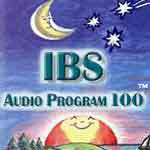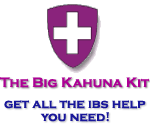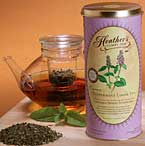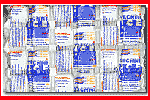| |
 |

Organic Acacia
Soluble Fiber
The prebiotic fiber that reduces bloating & gas!

In this Issue...
Food & Recipes
Rx News & Research
Ask Heather
About Us

Gut-directed hypnosis is one of the most effective ways to help relieve all IBS symptoms! Results can last more than 5 years.


Try Peppermint Caps
Peppermint Caps are the best for abdominal spasms, cramps and pain!

Get the IBS Diet Kit!
With Eating for IBS, plus organic fennel tea for bloating and gas, plus peppermint caps to prevent spasms and pain.
Take control of your IBS!

Get stable now ~
and stay that way!
Did you miss the latest
IBS newsletter and
Sourdough Toasts with
Smoky Tomato Jam?
Past issues
are posted here!


Try Heather's
Peppermint Tummy Tea
Peppermint is a smooth muscle relaxant and has pain-killing properties. Our tea is large leaf with a high volatile oil content - much stronger than tea bags!
 Need help?
Need help?
Have questions?
Come
join the IBS Message Boards!


The IBS Starter Kit!
Learn every way possible to successfully manage your symptoms!
With the First Year: IBS, an essential guide, plus Eating for IBS, plus Acacia Tummy Fiber to start stabilizing immediately!

Heat Therapy for
IBS
Hot packs can help prevent stress-related attacks!
|
 |
|
| |

IF YOUR NEWSLETTER IS HARD TO READ OR IF THE LINKS DON'T WORK,
Please copy and paste this address into your browser window:
http://www.helpforibs.com/news/newsletter/lempraw021104.html
February 11, 2004
This week ~ Vitamins, bloating, gas & IBS
Hello to everyone -
Here's a light and zesty one-dish dinner that comes together in a flash! Lemon Shrimp & Spinach Fettucine is a delicious meal that's quite lovely, too. The dish feature baby shrimp in a creamy lemon sauce over tender pasta, with the colorful addition of fresh spinach.
This recipe is a good example of how to safely incorporate an insoluble fiber vegetable you need for good health without triggering an IBS attack. The fresh spinach is finely shredded and the stems are removed, it's well-cooked in the lemon sauce, and it's incorporated into a high soluble fiber foundation from the pasta.
The lemon cream sauce is a delightful surprise for folks who thought they had to give up luscious pasta sauces. The trick here is to simply use soy or rice milk, thickened with a touch of cornstarch, and livened up with fresh lemon zest. If you like, you can also add a little soy/rice Parmesan for extra flair. The sweet succulence of fresh garden shrimp adds the final delicious touch!
As always, we have the latest IBS and digestive health news, research, and studies as well, so enjoy.
Best Wishes,
Heather Van Vorous
Note: Did a friend send you this newsletter? Sign up here for your own free subscription.

Lemon Shrimp & Spinach Fettucine
Makes 4 servings
1 T olive oil
3 cloves garlic, minced
zest of 2 fresh lemons
2 T fresh lemon juice
3/4 C fat free chicken or veggie broth
1 C plain soy/rice milk
1/2 t salt
2 t cornstarch mixed with 1 T cold water
1 small bunch spinach, cleaned, stems removed, leaves shredded
1 lb. cooked baby (salad) shrimp
12 oz. fettucine or spaghetti
2 T dried parsley or dill, or a combination
Salt and pepper to taste
Soy/rice Parmesan (optional)
Put a large pot of water on to boil for the pasta. In a large nonstick skillet, heat olive oil until hot over medium heat. Add garlic and cook, stirring, until golden. Add the lemon zest, juice, and broth and cook for one minute. Stir in the soy/rice milk and salt and bring mixture to a boil. Stir in the cornstarch slurry and cook, stirring, until slightly thickened. Add shredded spinach and stir until wilted. Remove from heat and stir in cooked shrimp.
Cook the fettucine in boiling water until just tender. Drain well and add to serving bowl. Add the parsley/dill and the shrimp-lemon sauce, and toss well. Add salt and pepper to taste, and top with soy/rice Parmesan if desired.
For oodles of delicious recipes, come visit the IBS Recipe Exchange Message Board!
Plus, our fabulous board moderator Mags just updated the IBS Recipe Exchange Index - over 500 recipes and counting!
Are you just learning how to eat for IBS? A little intimidated at the thought of special IBS recipes? Don't worry! Come see
the IBS Diet pages, and find the answers to all your questions.
 Many People Diagnosed with IBS Don't Meet New Diagnostic Criteria
Many People Diagnosed with IBS Don't Meet New Diagnostic Criteria
Diagnosis of irritable bowel syndrome (IBS) and other functional bowel disorders (FBD) is based on symptom evaluation. Clinical criteria have changed over time, yielding different proportions of subjects fulfilling diagnostic requirements. According to new diagnostic criteria (Rome II), subjects considered some years ago to have IBS no longer do so. The aim of this article is to evaluate how patients diagnosed as having IBS according to original Rome criteria have been split, and to which clinical diagnosis they belong today.
The study concluded that many subjects meeting original Rome criteria for IBS do not meet Rome II criteria: approximately one quarter of subjects do not have sufficient symptom duration or frequency to be diagnosed with IBS and almost half are now considered as having other ("major" or "minor") FBD.
Check here for more
information about this study...
Check here to learn about the Rome II Guidelines for IBS...
Psychological Factors in Irritable Bowel Syndrome
The role of psychological factors in the irritable bowel syndrome (IBS) is a matter of debate. The prevalence of psychiatric disorders is high in IBS patients. Positive response to antidepressant therapy and presence of family history of depression in IBS patients have led to speculations whether this syndrome might be regarded as an affective spectrum disorder. This study tried to examine the possible association of IBS with affective spectrum disorders, and the study results support the hypothesis that IBS might be linked to affective spectrum disorder.
Check here for more
information...
Social Learning, Affective State and Passive Coping in IBS & IBD
The association between the use of passive coping strategies to deal with pain and reported levels of anxiety, depression, and parental reinforcement of illness behavior was examined in individuals with Irritable Bowel Syndrome (IBS) and Inflammatory Bowel Disease (IBD). The degree to which the emotional component of passive coping, associated with psychological distress in both groups, can be considered in terms of 'coping strategies', rather than markers of illness-related distress, is discussed.
Check here for more
information...
Family Practitioners' Attitudes and Knowledge about IBS
Primary physicians care for most patients with irritable bowel syndrome (IBS), but data on their attitudes and knowledge about the disorder are limited to research in the UK. The purpose of the present study was to assess US family practitioners' attitudes and knowledge about IBS and determine the effect of a single education class on these measures. The study concluded that these US family practitioners had attitudes about IBS patients and lacked knowledge that could interfere with patient care. A single class improved short-term knowledge but had little effect on attitudes about IBS.
Check here for more
information...
Successful Results of Antegren Trial for Crohn's Disease
Irish pharmaceutical firm Elan Corp Plc raised market hopes for its much-vaunted experimental drug Antegren after it announced successful results from a key clinical trial in Crohn's disease. The results of the phase III trial on Crohn's disease showed no recurrence of the disease during a 6-month course of the drug, Elan said. There was a significant treatment difference of more than 30% in patients taking the drug compared with those taking a placebo, and no difference in the rate of side effects.
Check here for more
information...
5-ASA Therapy for IBD No Bar to Colon Cancer
Contrary to previous reports, new study findings suggest that treatment with 5-aminosalicylate (5-ASA) does not prevent colorectal cancer in patients with inflammatory bowel disease.
In studies in the UK and Denmark, Dr. Charles N. Bernstein and colleagues from the University of Manitoba in Winnipeg, Canada note that 5-ASA use has been linked to a reduced risk of cancer in patients with ulcerative colitis and Cohn's disease. However, it is possible that patient selection bias may have influenced these results. New study findings conclude that 5-ASA does not reduce the risk of colon cancer in such patients. However, further studies with a larger sample size and longer duration of use are needed to completely rule out an anti-cancer effect.
Check here for more
information...
Looking for the latest IBS research and news?
Check out the IBS Research Library!
 Common Pitfalls ~ The Seven Sneaky Deadly Sins of the IBS Diet
Common Pitfalls ~ The Seven Sneaky Deadly Sins of the IBS Diet
"I'm following the Eating for IBS diet, but I still have problems. What am I doing wrong?"
I hear from many people who have made a great effort to modify their diet for IBS, but who still have abdominal symptoms they feel certain are associated with their eating habits. They're often very frustrated because they believe that there aren't any steps left for them to take. The good news here is that it's much more likely than not that there are still dietary triggers involved, they're simply being overlooked.
I've found that there are seven specific pitfalls that ensnare many people as they adjust their diet - let's call them the Seven Sneaky Deadly Sins of the IBS Diet:
1. Coffee (yes, decaf counts)
2. Yogurt (it's the safest dairy product for IBS...isn't it?)
3. Alcohol (just one glass of wine is okay, right?)
4. Vitamin supplements (they're good for you, aren't they?)
5. No insoluble fiber foods (they're triggers, so you just don't eat them, right?)
6. Too low a dosage of soluble fiber supplements
7. Not drinking enough water (doesn't soda pop count?)
Fourth on the list is...
#4. I'd like to take a multi-vitamin and multi-mineral supplement just to be sure that I'm getting the nutrients I need. But every time I take my vitamin pills I feel worse, not better. What's going on?
Vitamin and mineral supplements in general often cause GI problems for people with IBS. Ask your local pharmacist about the most tolerable brands of vitamins in their store. GI upsets are very common with vitamins, and pharmacists are familiar with this request. Prenatal vitamins may be an option, as they are sometimes formulated specifically to help minimize the risk of GI side effects. You may be able to simply phone in a prescription request for these from your doctor - just explain why you need them. You may also want to ask your doctor about intraveneous vitamins or vitamin shots if you are unable to tolerate oral vitamins.
Liquid vitamins or powder caplets may also be more tolerable than pills. Another thing to consider is the fillers and additives in many vitamins; check the ingredients for lactose, artificial colors, and preservatives, as many people with IBS are sensitive to even small quantities of these substances. A health food store may have a wider variety of additive-free vitamins than a drug store. It's often helpful to take two or three smaller-dose vitamin/mineral supplements each day instead of one large dose. This will not only reduce the risk of GI upsets, but will aid your body in absorbing the nutrients as well. If you can't find smaller-dose vitamins, try just breaking a regular pill in half. Always take your vitamins with a meal, and never on an empty stomach.
Vitamin C is particularly notorious for causing gas, abdominal cramps, and diarrhea. Vitamin C is ascorbic acid, and as the name implies, it's acidic. When it enters the alkaline environment of the lower intestinal tract it can create diarrhea and gas. In Germany, vitamin C is actually an approved laxative, so imagine what it will do to you if you have IBS. The recommended dose for Vitamin C is generally under 2,000 mg. daily. Over that, and you really risk the GI side effects. Unless your doctor has recommended otherwise, make sure your multivitamin does not exceed one hundred percent of the US RDA for Vitamin C.
Calcium, magnesium, and iron all require special consideration as well. Calcium can have a constipating effect, which can be helpful or hurtful depending on your symptoms. Magnesium can have a laxative effect, and this too can either aid or exacerbate IBS, depending on the individual. For many folks with IBS, it's best to make sure that your mineral supplement is not giving you a megadose of either one of these ingredients, but simply a balance of the two. Calcium carbonate contains just calcium and no magnesium, and is a good choice if you always tend towards diarrhea. If you're IBS-C (prone to constipation), try calcium citrate instead, which contains magnesium. With either form of calcium, there should be Vitamin D included in the supplement as well for the best possible absorption. It's a good idea to take only 500 mg. of calcium per dose, as your body may not be able to absorb more than this all at once.
Iron can cause stomach upsets and be quite constipating. Iron also blocks the absorption of calcium. If you aren't anemic or prone to anemia, you may well not need an iron supplement at all. If you do need to take an iron supplement and you're also taking calcium, have these supplements with different meals. Iron is best absorbed in the presence of Vitamin C. If you're trying to juggle all of these different supplements, it can be helpful to take your multivitamin with C and iron at one meal, and your calcium or calcium/magnesium combination with Vitamin D at another meal.
If you're also taking a soluble fiber supplement like Acacia, don't worry about timing your supplement around your vitamins/minerals. Soluble fiber will not interfere with the absorption of vitamins/minerals any more than food would. You can also take herbal supplements such as peppermint or fennel at the same time you have your vitamins/minerals.
As a rule, it's always best to get your nutrition from as wide a variety of fresh fruits, vegetables, legumes, grains, and nuts as possible. There are many nutrients in whole foods that simply can't be extracted into pills. If you're struggling to add enough nutrition to your diet, check the IBS guidelines for incorporating insoluble fiber foods into your meals, and take a look at IBS safe recipes that offer good examples of how to do this. Until you're able to stabilize your IBS, you may not want to add in any vitamin/mineral supplement at all (unless medically necessary); this will eliminate the risk of the potential GI upsets from the supplements.
Coming next...#5 on the list of the Seven Sneaky Deadly Sins of the IBS Diet!
 Heather & Company for IBS, LLC is dedicated to serving people with Irritable Bowel Syndrome. Our mission is to provide education, support, and products that allow people with IBS to successfully manage their symptoms through lifestyle modifications.
Heather & Company for IBS, LLC is dedicated to serving people with Irritable Bowel Syndrome. Our mission is to provide education, support, and products that allow people with IBS to successfully manage their symptoms through lifestyle modifications.
We offer extensive information and tangible help for IBS, including the world's best-selling and best-reviewed books for the disorder. We provide the internet's top IBS web site resources; a twice-monthly IBS Newsletter; seminars and classes; dietary brochures for patient distribution by health care professionals; an IBS Research Library; and Heather Cooks!, a healthy cooking show on Seattle television. Much of our work is based on Heather's development of the first and only comprehensive IBS dietary guidelines and recipes, an achievement which has earned numerous awards and accolades as well as thousands of thank you letters from IBS sufferers.
Heather & Company also provides the only patient-expert moderated IBS Message Boards on the internet with forums for diet, recipes, hypnotherapy, yoga, plus Crohn's and Colitis. In addition, we support and coordinate the formation and continuation of local in-person IBS support groups across the USA, Canada, the UK, Australia, and New Zealand. We will soon have other IBS services and products available.
Our website receives over 1.8 million visits each year, and our newsletter is sent to over 19,000 people. We are regular exhibitors at the Digestive Disease Week and American Dietetic Association conferences.
Sponsorship opportunities are available for the message boards and this newsletter for companies and/or products that have been legitimately established as helpful for digestive disorders.
Please contact us for information.

You are receiving this email because you have expressed interest in IBS news and information.
To unsubscribe from Heather's IBS Newsletter, click here http://www.helpforibs.com/news/unsub.asp or send an email to heather@helpforibs.com.
If you are viewing this newsletter on a website and would like to subscribe for email delivery, please "Join the IBS Newsletter" here.
ANTI-SPAM PRIVACY POLICY
LEGAL DISCLAIMER - This email is not intended to replace the services of a physician, nor does it constitute a doctor-patient relationship. Any application of the recommendations in this email is at the reader's discretion. Heather Van Vorous and Heather & Company for IBS, LLC are not liable for any direct or indirect claim, loss or damage resulting from use of this email and/or any web site(s) linked to/from it. Readers should consult their own physicians concerning the recommendations in this email.
Heather & Company for IBS, LLC
409 10th Avenue East Suite 202
Seattle, WA 98102 USA
© 2004 Heather & Company for IBS, LLC. All rights reserved.
|
|
|
|